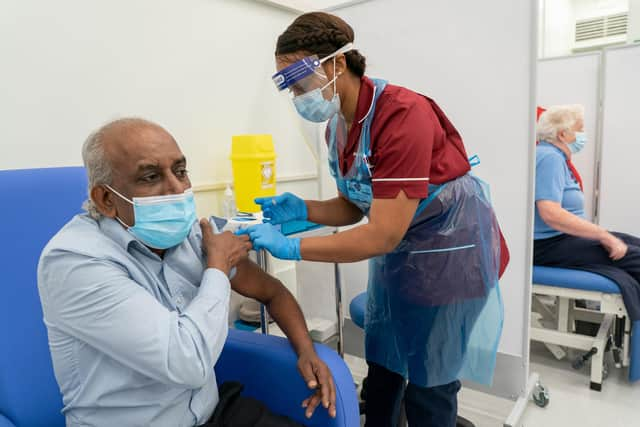Covid: Antiviral drugs that boost humans' 'interferon' immune response can help tackle current and future pandemics – Professor William Stimson
Worldwide, we are searching for ways to inactivate major viruses – from influenza, HIV, HBV and coronaviruses such as Sars, Mers and Covid-19 – in order to reduce the unwanted responses associated with them.
With regards to Covid-19, we have witnessed a Herculean effort in developing vaccines, and whilst the UK is arguably on its way to achieving ‘endemic’ status, the world is not remotely close to saying goodbye to this virus. It is here to stay and will likely remain a threat – perhaps not to everyone, but certainly to those with weakened immune systems, especially if it continues to mutate.
Advertisement
Hide AdAdvertisement
Hide AdFrom recent experience, we know that the emergence of new strains, and the questions that these mutations trigger, means that relying on a vaccine alone is not enough. Looking ahead, there is the risk of new coronaviruses and new global pandemics.
Preventing a pandemic may not be possible, but the last couple of years has taught us that preparedness is key. We must focus on producing therapeutic solutions which can fight a virus as soon as there is an outbreak. That’s where interferons come into play.
Interferons are antiviral molecules that all humans produce, as do very many other organisms. They ‘interfere’ with viral reproduction and are the first to respond when an infection is detected to prevent the virus from replicating.
They are key to the body’s innate immune response, which is our first line of defence against invading pathogens, and also have strong links into adaptive immunity.


These include synthetic therapeutic interferons which have shown great promise against Covid-19 in laboratory testing. Work at the University of St Andrews has led to the production of a wide-spectrum, antiviral biological drug called Alfacyte based on this concept by ILC Therapeutics. This drug essentially strengthens the ‘wall’ of the innate immune system to not let Covid-19 or other viruses through its barricade.
Having a working therapeutic interferon, which accelerates the body’s innate response to viral infection, could radically change future pandemic responses by acting as an immediate ‘upstream’ response to disease outbreak whilst more adapted ‘downstream’ solutions, such as vaccines, are developed. This could save many lives, prevent hospitalisations and reduce the need for aggressive social restrictions which have a high cost on society.
We must be able to protect ourselves with an effective anti-viral therapeutic product, and we must be ready to deal with the next large-scale virus when it comes, especially as we wait for a vaccine. Investing in diverse and innovative treatments alongside vaccines with equal priority is the way forward.
By doing so, we can achieve the therapeutic potential to prevent the world being held hostage again – whether by a future strain of Covid-19 or the next pandemic.
Advertisement
Hide AdAdvertisement
Hide AdProfessor William Stimson is a fellow of the Royal Society of Edinburgh and founder and chief scientific officer of ILC Therapeutics. This article expresses his own views. The RSE is Scotland's national academy, bringing great minds together to contribute to the social, cultural and economic well-being of Scotland. Find out more at rse.org.uk and @RoyalSocEd.
A message from the Editor:
Thank you for reading this article. We're more reliant on your support than ever as the shift in consumer habits brought about by coronavirus impacts our advertisers.
If you haven't already, please consider supporting our trusted, fact-checked journalism by taking out a digital subscription.
Comments
Want to join the conversation? Please or to comment on this article.
